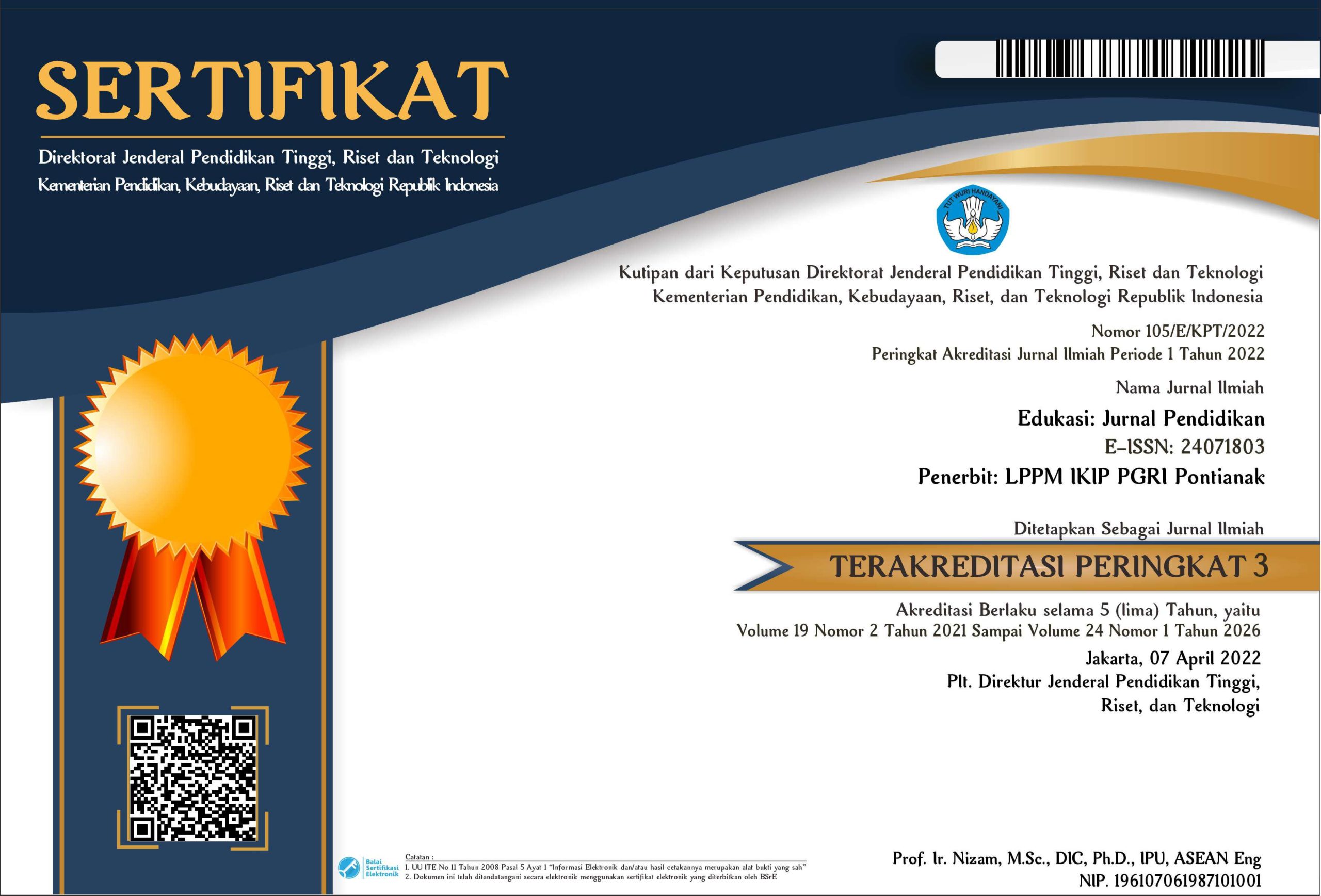Study of Students’ Vocabulary Difficulties in Third-Semester Students of Food Technology Major
DOI:
https://doi.org/10.31571/edukasi.v19i1.2347Keywords:
vocabulary, vocabulary difficulties, descriptive qualitative, kosakata, kesulitan belajar kosakata, deskriptif kualitatifAbstract
Abstract
This research aimed to know the students’ vocabulary ability and difficulties in learning vocabulary. The subject of the research was the third-semester students of Food Technology. The method used in this research is descriptive qualitative with questionnaire and interview as the instruments of data collecting. The data was analyzed qualitatively with the process of data collection, data reduction, and data display/conclusion drawing. The result of the research showed the students still have low vocabulary ability and there are some vocabulary difficulties experienced by the students, they have a very limited number of vocabularies; mispronounce English words; spelling English words especially for ‘a’, ‘I’, and ‘e’; do not understand long and complex words such as public health center, expired date, and fish spoilage. The students also have problems with range, connotation, and idiom in English.
Â
Abstrak
Penelitian bertujuan untuk mengetahui kemampuan kosakata dan kesulitan mahasiswa dalam belajar kosakata bahasa Inggris. Subjek penelitian adalah mahasiswa semester tiga Jurusan Teknologi Pangan. Metode penelitian menggunakan deskriptif kualitatif dengan kuesioner dan wawancara sebagai instrumen pengumpulan data. Data hasil penelitian dianalisis secara kualitatif dengan tahap pengumpulan data, pengurangan data, dan penarikan kesimpulan. Hasil penelitian menunjukkan mahasiswa semester tiga Jurusan Teknologi Pangan Politeknik Tonggak Equator memiliki kemampuan kosakata bahasa Inggris yang rendah dan terdapat beberapa kesulitan belajar kosakata yang dihadapi yaitu memiliki pembendaharaan kosakata bahasa Inggris yang rendah, memiliki kesulitan dalam pelafalan dan pengejaan ‘a’, ‘I’, dan ‘e’, tidak mengerti kosakata yang panjang dan rumit, memiliki masalah dengan penerjemahan. Mahasiswa juga memiliki masalah dengan penyusunan kata, konotasi, dan idiom dalam Bahasa Inggris.
Downloads
References
Afzal, N. (2019). A study on vocabulary-learning problems encountered by BA English Majors at the university level of education. Arab World English Journal (AWEJ), 10(3), 81-98. https://dx.doi.org/10.24093/awej/vol10no3.6.
Al-Hinnawi, A. N. (2012). The effect of the graphic organizer strategy on university students English vocabulary building. English Language Teaching, 5(12), 62-69. http://dx.doi.org/10.5539/elt.v5n12p62.
Anil, B. (2011). Teaching vocabulary through games-a sanguine step. Journal on English Language Teaching, 1(4), 46-50.
Alqahtani, M. (2015). The importance of vocabulary in language learning and how to be taught. International Journal of Teaching and Education, 3(3), 21-34. http://dx.doi.org/10.20472/TE.2015.3.3.002.
Astika, I. G. (2016). Vocabulary learning strategies of secondary school students. IJOTL-TL: Indonesian Journal of Language Teaching and Linguistics, 1(1), 1-18. https://doi.org/10.30957/ijoltl.v1i1.1.
Bakhsh, S. A. (2016). Using game as a tool in teaching vocabulary to young learners. English Language Teaching, 9(7), 120-128. https://doi.org/ 10.5539/elt.v9n7p120.
Bin-Tahir, S. Z. (2015). Improving students’ speaking skill through voice chat at University of Iqra Buru. Journal of Modern Education Review, 5(3), 296-306. https://doi.org/10.15341/jmer(2155-7993)/03.05.2015/009.
Hancock, O. (1987). Reading skills for college students. New Jersey: Prentice- Hall.
Hariyanto, & Wulandari, F. (2019). An analysis of students’ english vocabulary mastery and translation ability in senior high school. Edukasi: Jurnal Pendidikan, 17(2), 250-263. http://dx.doi.org/10.31571/edukasi.v17i2.1239.
Hatch, E., & Brown, C. (1995). Vocabulary, semantics, and language education. New York: Cambridge University Press.
Lehr, F., Osborn, J., & Hiebert, E. H. (2004). A focus on vocabulary. Honolulu, HI: Pacific Resources for Education and Learning.
Moeller, A. J., Ketsman, O., & Masmaliyeva, L. (2009). The essentials of vocabulary teaching: From theory to practice. Diverse by Design. Central States Conference Report. Pp. 1-16. Carolyn Guiscoigne and Melanie Bloom, Editors, Eau Claire, WI: Crown Prints.
Nation, P. (2001). Teaching and learning vocabulary. New York: New House Publisher.
Nation, I. S. P. (2000). Learning vocabulary in another language. Cambridge: Cambridge University Press.
Pyles, T. (1970). English: An introduction to language. San Diego: Harcourt College Pub.
Ramadhaniarti, T. (2016). Teaching English vocabulary through game: Views from students. Proceeding of the Fourth International Seminar on English Language and Teaching (ISELT-4) University of Bengkulu.
Salam, U. & Nurnisa (2021). Students’ difficulties in learning vocabularies. English Community Journal, 5(1), 46-53. https://doi.org/10.32502/ ecj.v5i1.3327.
Schmitt, N. (2000). Vocabulary in language teaching. Cambridge: Cambridge University Press.
Thornbury, S. (2004). How to Teach Grammar. Essex: Pearson Education Limited.
Thornbury, S. (2002). How to teach vocabulary. Harlow: Pearson Education Limited.
Viera, T. R. (2017). Vocabulary knowledge in the production of written texts: A case study on EFL language learners. Revista Tehnologica ESPOL, 30(3), 89-105.
Wilkins, D. (1972). Teaching vocabulary. https://www.tesol.org. Accessed at 9 December 2020.
Downloads
Published
How to Cite
Issue
Section
License
Authors who publish in this journal agree to the following terms:
- Authors retain copyright and grant the journal the right of first publication with the work simultaneously licensed under a Creative Commons Attribution License (CC-BY-NC) that allows others to share the work with an acknowledgment of the work's authorship and initial publication in this journal.
- Authors are able to enter into separate, additional contractual arrangements for the non-exclusive distribution of the journal's published version of the work (e.g., post it to an institutional repository or publish it in a book), with an acknowledgment of its initial publication in this journal.
- Authors are permitted and encouraged to post their work online (e.g., in institutional repositories or on their website) prior to and during the submission process, as it can lead to productive exchanges, as well as earlier and greater citation of published work.

 Download: 1561
Download: 1561


















